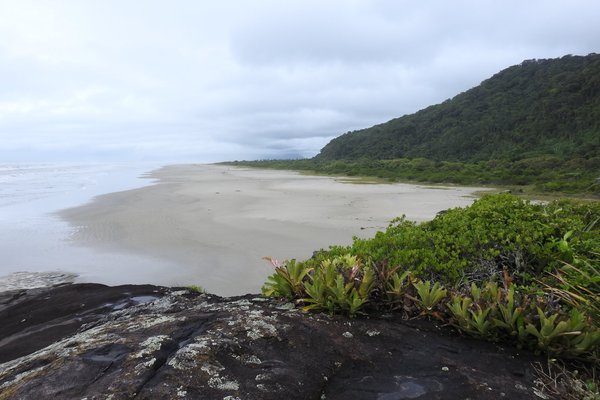Brazil
Atlantic Forest South-East
The Atlantic Forest South-East Reserves comprise 25 protected areas of rare remnants of Atlantic Forest.
The areas range from mountain summits to beaches and include marine and coastal ecosystems. Brazilian Atlantic Forest is the richest rainforest in terms of biodiversity. It has high endemism and a large number of tree species. Rare and threatened animals found here include primates such as the woolly spider monkey, southern muriqui, and four species of tamarin, while ocelot and jaguar occur as well.
Community Perspective: Jureia - Itatins Ecological Station seems to be the favourite location of our reviewers as it is within reach from Sao Paulo. Iain described some additional coastal locations, and João covered Intervales State Park.
Site Info
Official Information
- Full Name
- Atlantic Forest South-East Reserves (ID: 893)
- Country
- Brazil
- Status
-
Inscribed 1999
Site history
History of Atlantic Forest South-East
- 1999: Referred
- As "Lagoon complex of Iguape" and "Paranapiacaba - Upper Ribeira": Bureau - Brazil tried to convert 3 sites into 2 part way through the process
- 1999: Revision
- Includes former TWHS Estuarine Lagoon complex of Iguape-Cananéia-Paranaguá (Lagamar Complex) (1999) and "Paranapiacaba - Upper Ribeira"
- 1999: Inscribed
- Inscribed
- Type
- Natural
- Criteria
- vii
- ix
- x
Links
- UNESCO
- whc.unesco.org
- Official
-
- gov.br — Superagui National Park
All Links
UNESCO.org
- whc.unesco.org — whc.unesco.org/
Official Website
- gov.br — Superagui National Park
Community Information
- Community Category
- Natural landscape: Forest
Travel Information
Recent Connections
-
Over 100 mammal species
The IUCN ev mentions 524 species of mam… -
Centres of Plant Diversity
SA17 Jureia-Itatins Ecological Station … -
Endemic monkey species
Superagüi lion tamarin
Connections of Atlantic Forest South-East
- Geography
-
-
Atlantic Forest
representing one of the largest and best-preserved domains of the Brazilian Atlantic Forest (OUV) -
Atlantic Ocean
Core zone borders the coast for a large stretch, Ilha do Mel is an island in the Atlantic Ocean -
Estuary
"The site is part of the Serra do Mar domain and extends across the adjacent coastal plain, which includes the estuarine complex of Iguape-Cananéia-Paranaguá." "From mountains covered by dense forests with an abundance of orchids and bromeliads to coastal islands and estuaries with a wealth of vast mangroves, the property offers a natural environment of great beauty with tremendous terrestrial and marine biodiversity." (Official description)
-
- Trivia
-
-
Tourist Treks
Caminho da Mata Atlântica
-
- History
-
-
Guarani
About 200 people live in the core zone most of whom are GuaraniSee eoearth.org
-
Qhapaq Nan (Inca)
The Peabiru Trail passes through the reserve. It was not an integral part of the Qhapaq Nan but was used by the Inca.
-
- Ecology
-
-
Sloths
brown-throated sloth, maned sloth -
Anteaters
giant anteater, southern tamandua -
Over 100 mammal species
The IUCN ev mentions 524 species of mammals (131 endemic), UNEP-WCMC states a more reasonable 264 species of mammals -
Dunes
Both coastal areas of Paraná and São Paulo are occupied by mobile sand dunes (Coastal WHS) -
Lagoons
-
Otters
La Plata otter -
Ratites
greater rhea -
Tapirs
Brazilian tapir -
Orchids
"dense forests with an abundance of orchids" (OUV) -
Critically endangered fauna species
The southern muriqui (Brachyteles arachnoides), a woolly spider monkeySee en.wikipedia.org
-
Endemic monkey species
Superagüi lion tamarin -
Jaguar habitat
"Amongst the flagship species are the jaguar, ocelot and the bush dog" (OUV) -
Mangroves
a wealth of vast mangroves (OUV)
-
- Architecture
-
-
Baroque
Ivapurunduva's 'Quilombo' ChapelSee www.eoearth.org
-
- World Heritage Process
-
-
Derived from more than one TWHS
"Lagoon complex of Iguape" and "Paranapiacaba - Upper Ribeira"
-
- Human Activity
-
-
Natural sites with indigenous human population
About 200 people live in the core zone most of whom are Guarani.See eoearth.org
-
- WHS on Other Lists
-
-
Centres of Plant Diversity
SA17 Jureia-Itatins Ecological Station - "The flora and fauna are extremely diverse and very rich. The flora is among the most diverse in the world, and in some areas one can encounter over 450 species of trees per hectare." -
World Heritage Forest Programme
-
Biodiversity hotspot
Atlantic Forest -
WWF Global 200
Terrestrial, Tropical and Subtropical Moist Broadleaf Forests: (48) Atlantic Forests (subregion Serra do Mar coastal forests)See web.archive.org
-
World Biosphere Reserves
Part of Mata Atlántica (including Sao Paulo City Green Belt) (1993; extension 2002)
-
- Timeline
-
-
Paleocene
Most of the elevations of Serra do Mar were formed about 60 million years ago. (wiki)
-
News
No news.
Recent Visitors
Visitors of Atlantic Forest South-East
- Alexander Lehmann
- Alvaro1404
- Bill Maurmann
- Carlos Sotelo
- CeeMon
- Cirene Moraes
- dave wood
- Deffra
- Els Slots
- emvcaest
- Fan Yibo
- Felicité
- Iain Jackson
- Jarek Pokrzywnicki
- João Aender
- Joel on the Road
- Ken DJ
- Krijn
- Kurt Lauer
- Liamps91
- Loic Pedras
- Luis Filipe Gaspar
- Maciej Gil
- manuel011197
- Michael Ayers
- Olli-Pekka Turunen
- Patrik
- Persian Globetrotter
- Philipp Peterer
- puessergio
- Rodinia
- Roman Bruehwiler
- sandersx2
- Sclowitz
- Shandos Cleaver
- Szucs Tamas
- Thomas Buechler
- Thomas van der Walt
- Xiquinho Silva
- Zoë Sheng
Community Reviews
Show full reviews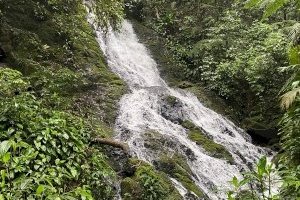
I visited another State Park that composes this WHS: Intervales. Atlantic Forest South-East is the only WHS in the State of São Paulo and some pristine areas of the State are within it. My favorites are Cardoso Island (a remote area where cars and new inhabitants are prohibited) and PETAR (full of caves, waterfalls and crystal-clear rivers). Intervales was a private area until 1995, when it became a State Park. The buildings formerly used for private purposes now belong to the State of São Paulo and are used as lodges. Interestingly, they are inside the park so that you can start your trekkings right after leaving front door. Intervales also has caves, waterfalls, cloud subtropical forest and rivers, none of those are as remarkable as the mentioned beforehand. But it is a delight for two or three days and I fully enjoyed being surrounded by nature for a long weekend.
Keep reading 0 comments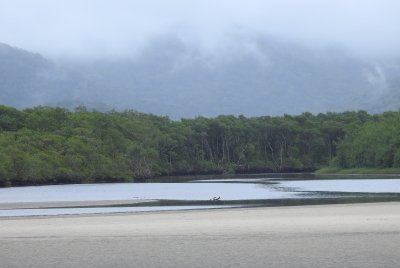
I had already given up on seeing more of these Atlantic Forests than a couple of birds spotted on a short forest walk. But the owner of my pousada kept pushing his contacts for tours to materialize, despite (1) it being a week day while Peruibe & Guarau live on weekend trippers from the big cities, and (2) it had rained consistently all day and the outlook for the next day was only slightly better at ‘medium rain’. Finally, I was able to join a private jeep tour to Praia Caramboré and Barra do Una with a company called Bioventura.
The WHS location that I visited was the Jureia - Itatins Ecological Station, the same as covered by several other community members. Fortunately, it did not rain anymore when we left for the park at 7.30 am the next morning. As others have noted, the road conditions are terrible, and they are even worse after days of rain. But we had a trusty 4WD. The guide, Ed, told that he is participating in jaguar research in the area – but they hadn’t found one yet. Lots of pumas and ocelots though show up on the camera traps. We would see few birds and no mammals during our visit – the forest is too dense and the weather was too cold.
From the village of Guarau, we drove inland to the reserve; it does have a guarded entrance gate, but no fee or other administration is required to enter …
Keep reading 0 comments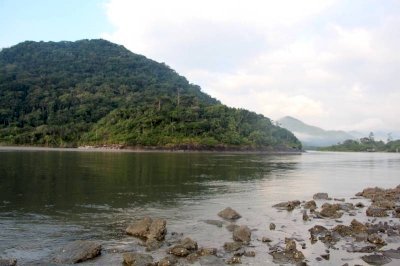
Like Jarek, I chose Peruíbe for my visit. It is probably the most convenient location to visit and took around 3 hours by rental car from Guarulhos airport. If you arrive at Congonhas it’s even closer, as you don’t have to pass through the center of São Paulo.
I spent the night in Guaraú, a village close to Peruíbe within the core zone. Guaraú beach is nice with some beautiful views over the park. I saw a lot of different birds early at the beach and only around 3 other people. As it’s not a overdeveloped touristy beach, it is still very much enjoyable. The nearby island also seems very nice from the pictures I saw, but with my limited research I didn’t find a way to get there. Instead I drove to the Paradise Waterfall.
The drive to the waterfall took 50 minutes, even though it’s only 12km. You can guess the road conditions when reading these numbers. Unsurprisingly the waterfall was not worth the effort to drive there and back. The low water level added to its unspectacular height and the cloudy weather gave it the rest. However, I’d still recommend doing, as the beach alone is not representative enough for this WHS and I only got the real “core zone feeling” when driving through the jungle on this muddy, rocky, bumpy, so called road. You can spend a month there, exploring this huge area, but a full day covers it pretty much.
Keep reading 0 comments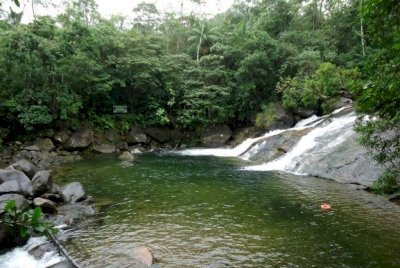
Just visited a part of rainforest (March 2013). As the site consist of several reserves, National Parks or ecological stations and mostly due to bad weather I decided to stick to one location to have an overall view of the area.
Because of communication issues I go to Peruibe (4 hours by bus from Sao Paulo - Terminal Rodoviário de Jabaquara, there are several buses daily) as the starting place for Jureia-Itatins Ecological Station, in fact a huge reserve, located just close to Peruibe town. If you cross the river you are already in the Jureia Park. The most beautiful place and highly recommended is called Cachoeira do Paraíso and is located some 25 km from Peruibe (there are some buses daily to get there at least in theory, because due to weather conditions the bus may occasionally not operate - it is better to check on Peruibe bus station a day before) or you can walk - on the asphalt road it is possible to hitch-hike.
It is written everywhere that there are only certain amount of people entitled to go to Cachoeira do Paraíso (small lake and waterfall, photo) but I did not encounter any troubles to go there - it is also not necessary to have licensed guide to go there as the path is well marked.
Some practicalities: I stayed overnight in Peruibe. There are a lot of accommodation places as this is huge touristic resort (Atlantic Ocean). Bus terminal (Terminal Rodoviário de …
Keep reading 0 comments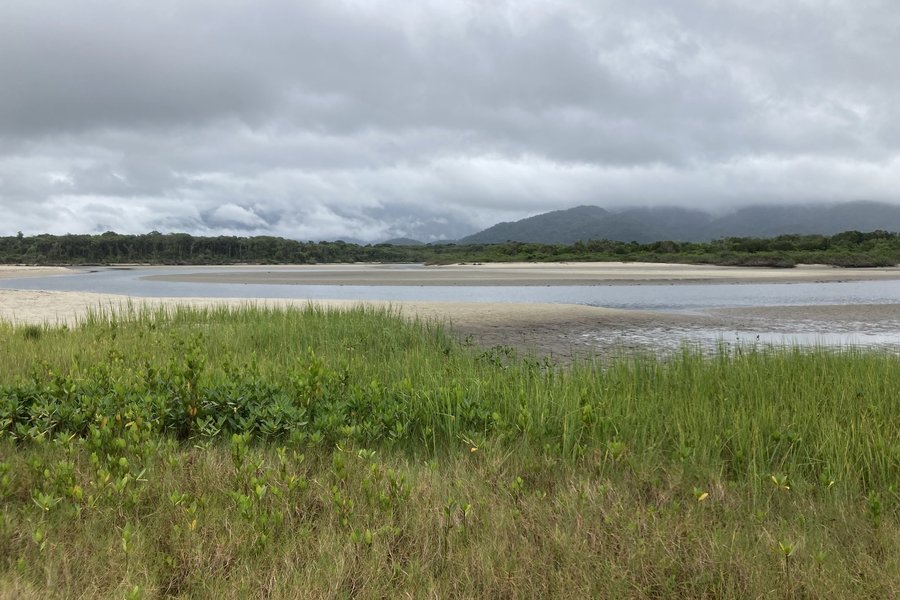
This is one of the largest, and most fragmented WHS I have ever visited. It consists of about 25 protected areas, National Parks, State Parks, Ecological Stations, wildlife Zones etc.
Some do not allow casual public access while others see large numbers of visitors, mostly, unsurprisingly, Brazilians.
In January 2009 I came off an overnight flight from London at Sao Paulo, took the city bus to Barra Funda bus station and from there a coach to Cananeia.
The site comprises of the Serra do Mar coastal mountain chain (with a maximum height of about 1400m), the coastal plain, the coastline itself and a number of offshore islands.
I had about 4 days in which to explore this huge and diverse area. I could find no way, using public transport, that would allow me to see both the karstic uplands and the coast so I decided to limit myself to just the coastal areas.
Cananeia is a small, characterful sea side town from where I made the brief ferry crossing to Ilha Comprida. My exploration of this large island were severely limited by the lack of public transport.
Throughout the 4 days the weather was never good, with a lot of heavy rain and low cloud so that next day a planned trip to Ilha do Cardoso had to be aborted.
I retreated to Curitiba, looking, unsuccessfully, for drier weather inland and the following day took "the best train ride in Brazil" to Morettes. It may well be but I'm afraid …
Keep reading 0 comments
